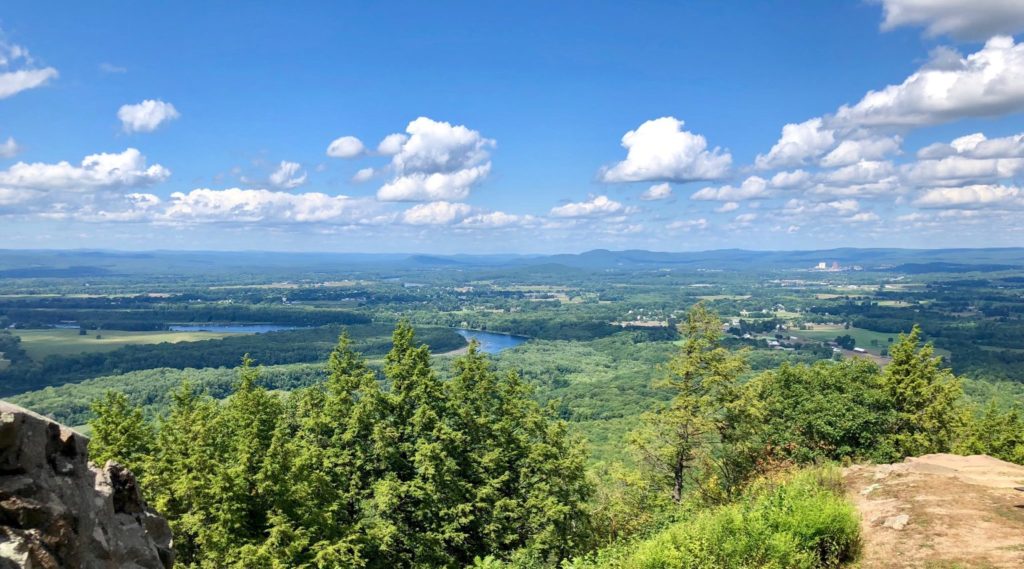Opinion: Where The Money Is. Solving A Global Problem

View from the top of Mount Holyoke in Massachusetts. Photo: Russ Vernon-Jones.
Love Justice And Climate Change

Let’s imagine our Earth without any national boundaries for a few moments. Our species, homo sapiens, lives throughout the world–with different cultures and skin colors, but one species. We are all siblings. We share one atmosphere. We all face a huge global crisis – the climate emergency.
People everywhere are being affected by climate change–some much more severely than others. But we are all affected and will be even more affected in the near future–by heat waves, droughts, forest fires, floods, catastrophic storms, disruptions in agriculture and food systems, climate refugees, and more.
Need To Work Together Globally
The biggest cause of this crisis is greenhouse gas emissions from the extraction and burning of fossil fuels, exacerbated by deforestation and unhealthy agricultural practices. Emissions anywhere, cause climate change everywhere. This means that humanity is going to need to work together to stop emissions everywhere. Stopping emissions in our own geographic region (or country) will not be sufficient to stop climate change. We must move rapidly to stop emissions everywhere.
While we might be tempted to expect everyone to just stop their own emissions, that’s not actually practical or realistic. It’s going to take a lot of money to transition economies everywhere to renewable energy while maintaining or developing an adequate standard of living. If wealth were equally distributed among all peoples, then each group of people could be responsible for stopping their own emissions and transitioning to green ways of living.
Renewable energy in developing nations will cost trillions
However, wealth is not equally distributed. Let’s bring national boundaries back into our discussion. Some countries are quite wealthy and some are much poorer. Poor countries have a responsibility to develop their economies to provide an adequate standard of living for their people. In many countries that development will increase the burning of coal, oil, and gas, unless money is provided from outside the countries to enable them to use renewable sources of energy. We are talking trillions of dollars. Where will all that money come from?
Because That’s Where The Money Is
I’m reminded of Willie Sutton, a life-long, U.S. bank robber in the early 1900’s. When asked why he robbed banks, he replied, “Because that’s where the money is.” If we need a lot of money, we need to go where the money is. First, lots of money is in the wealthy, predominately white, nations–especially the United States. Within the U.S. the largest amounts of money are in the hands of the wealthy elite and in the military budget.
The richest people in the U.S. are obscenely wealthy. The top 1% have 15 times the wealth of the bottom 50% of the population combined. In the first two years of the pandemic, U.S. billionaires (not the top 1%, just the billionaires) increased their wealth by $2.1 trillion.
So there is plenty of money for the U.S. to very significantly fund climate action in low-income nations. I would advocate that none of that money come from working and middle class families, but come entirely from the ultra-rich. They are not going to offer this money, we are going to have to take it from them by taxing the rich.
Not A New Idea
The idea that wealthy nations must fund climate action in developing nations is not new. At the UN Climate Conference in Copenhagen in 2009 the developed nations committed to a collective goal of mobilizing $100 billion per year by 2020 to fund climate action in developing nations. In 2019, Bernie Sanders’ platform as he campaigned for the Presidential nomination included $200 billion from the U.S. for the UN Green Climate Fund for reducing emissions in developing nations. Neither amount has been provided, of course, and it’s now clear that the needed amounts are even greater.
The Only Way We Can Eliminate Global Emissions
Paying for climate action in developing nations with funds from the wealthy developed nations is necessary because it’s the only way we can eliminate global emissions. There is no way developing nations can fund the transitions and green development that are needed, yet if they are not funded, the climate will continue to deteriorate and the planet will no longer be able to sustain civilization as we know it. So the money must come from those who have it. (One bonus here is that money spent on climate mitigation in developing nations goes further and has an even bigger impact than spending that same amount in the U.S.)
Also A Moral Argument
My key argument here is that this is a necessity and the only way to stop climate change. However, I want to note that there is also a moral argument. The U.S. and other wealthy, predominately white, nations have built their economies and gotten rich by burning fossil fuels and taking valuable resources from developing nations.
The U.S. has emitted more greenhouse gases cumulatively than any other nation. We have not paid the costs of dumping our emissions into the atmosphere. The whole world is now paying those costs in grappling with the effects of climate change. So, under the principal of “polluter pays” the costs of global climate change are ours to pay (along with other wealthy nations). In addition to the costs of transitioning to renewable energy, the costs that developing nations are already experiencing as a consequence of climate change–such as the current flooding in Pakistan–are also the responsibility of the wealthy nations that have caused climate change.
It’s Time To Spread This Idea Widely
What can we, the public, do about this? For starters, I recommend that we all engage in conversations, social media posts, letters to the editor, and other communication to spread the idea that the U.S. must provide large sums for climate action in developing nations in order to stop global climate change, and that the money should come from the very rich.
You might also want to sign a Sierra Club petition calling on President Biden and his climate negotiators at the upcoming COP27 to acknowledge that the countries most responsible for climate change must begin paying the costs of loss and damage from climate change in developing nations.
Note: You can read or re-read one of my earlier posts on this topic at “What’s a ‘Fair Share’ and Who Should Pay It?“
Russ Vernon-Jones was principal of Fort River School 1990-2008 and is currently a member of the Steering Committee of Climate Action Now-Western Massachusetts. He blogs regularly on climate justice at www.russvernonjones.org.
